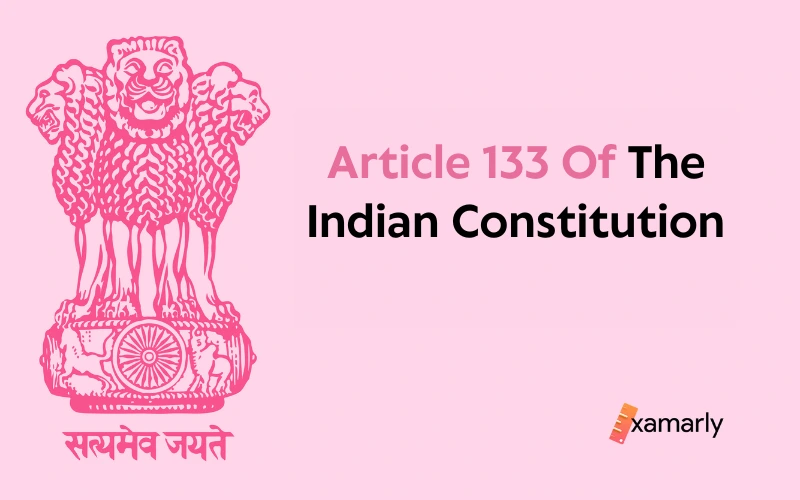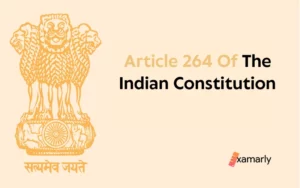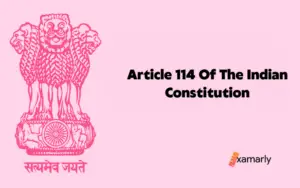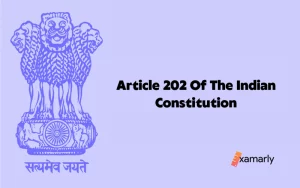In appeals from High Courts involving civil matters, the Supreme Court has appellate jurisdiction under Article 133 of the Indian Constitution.
The aforementioned Article is outlined in Part V of the Constitution.
This article is worth reading for UPSC aspirants as it is a part of the Indian Polity Of IAS Syllabus.
- Article 133 Of The Indian Constitution
- Conclusion
- FAQs
- According To Article 133 Which Court Can Grant Certificate?
- Which Amendment Of The Indian Constitution Has Amended Article 133?
- Under Which Article Appeals Can Be Made To Supreme Court In Civil Matters?
- What Does Article 134A Entail?
- What Is Clause 1 Of Article 133?
- What Is The Difference Between Judgement And Decree?
- What Is Jurisdiction?
Article 133 Of The Indian Constitution
- Any judgement, decree, or final order in a civil matter of a High Court in the territory of India may be appealed to the Supreme Court if the High Court certifies pursuant to article 134A—
- (a) The case concerns a substantial question of law of general significance; and
- (b) the High Court is of the opinion that the Supreme Court must decide the aforementioned question.
- Any party appealing to the Supreme Court under clause(1) may assert, notwithstanding anything stated in article 132 of the Indian Constitution, as one of the grounds in such appeal that a substantial question of law regarding the interpretation of this Constitution has been incorrectly decided.
- Despite anything in this article, no appeal from a judgement, decree, or final decision of one Judge of a High Court shall lie to the Supreme Court, unless Parliament by law otherwise provided.
Conclusion
According to the provisions of Article 133 of the Indian Constitution, the Supreme Court has appellate authority in cases involving appeals from High Courts involving civil proceedings.
The said Article of the Constitution of India was revised in the 30th amendment and the 44th amendment of the Constitution.
In both civil and criminal cases involving substantial questions of law pertaining to the interpretation of the Constitution, the Supreme Court’s appellate jurisdiction may be exercised by means of a certificate issued by the High Court in question pursuant to Articles 132(1), 133(1), or 134 of the Constitution.
For Further Readings:
FAQs
According To Article 133 Which Court Can Grant Certificate?
According to Article 133, the High Court issues a Certificate of Fitness to the party in order to enable the other party to appeal to the Supreme Court. Two requirements could apply before the certificate is issued:
1. The case related to the substantial question of law
2. The High Court has determined that the Supreme Court is the appropriate venue to resolve the dispute.
Which Amendment Of The Indian Constitution Has Amended Article 133?
30th amendment and 44th amendment modified Article 133.
Under Which Article Appeals Can Be Made To Supreme Court In Civil Matters?
According to Article 133 of the Indian Constitution, the Court must make a decision if there is a substantial question of law or if a decision has been made incorrectly. In some situations, the High Court issues a certificate allowing appeals to the Supreme Court. The deadline for filing the appeal is sixty calendar days from the date the High Court granted the certificate.
What Does Article 134A Entail?
Article 134A addresses the certification for an appeal to the Supreme Court.
What Is Clause 1 Of Article 133?
If the High Court certifies in accordance with article 134A, any judgment, decree, or final order in a civil action issued by a High Court on Indian territory may be appealed to the Supreme Court.
What Is The Difference Between Judgement And Decree?
1. A judgment is a declaration based on a ruling or order made by a judge. The decree is a formal declaration of a ruling in which the court making the ruling determines the rights of the parties incontrovertibly.
2. Judgment is the set, and decree is its sub-set because the decree is always implemented after the judgment has been rendered.
3. The case’s facts serve as the foundation for judgment. The judgment serves as the foundation for a decree.
4. There are no different types of judgment. There are three different types of decrees: preliminary, final, and partially preliminary and partially final.
What Is Jurisdiction?
The definition of jurisdiction is the extent to which a court of law may exercise its jurisdiction over actions, lawsuits, appeals, etc. The idea of jurisdiction was first introduced in law with the justification that a court should only be able to try and decide cases that it has some connection to or that fall within the geographical, political, or monetary boundaries of its authority.






